Best of #econtwitter - Week of November 21, 2021 [1/2]
Nov 22, 2021
Welcome readers old and new to this week’s edition of Best of Econtwitter. Thanks to those sharing suggestions, over email or on Twitter @just_economics.
This is part one of two. Part two is here.
Paper summary threads

Cristobal Young@cristobalyoung5
Your health depends on where you live. But it wasn't always that way
In 1968 (top row), no correl between midlife mortality and state income. Arkansas and NY had same mortality rates
By 2019 (2nd row), ppl in rich states live much longer
Mortality now lines up w state income

1:56 PM · Nov 16, 2021
30 Reposts · 95 Likes

John Protzko@JProtzko
Swedish schools that implemented a cell phone ban so no resulting change in grades or national math test scores of their students (N = 16,724).
Maybe, just maybe, we need to stop blaming technology all the time
from @danykessel @BTyrefors
econstor.eu/bitstream/1041…


1:14 PM · Nov 15, 2021
33 Reposts · 83 Likes

Leopold Aschenbrenner@leopoldasch
Related to this, there’s a great AER paper by @mdoepke and Kindermann “Bargaining over Babies.”
Both partners have to agree to have another child. And in survey data, women are more likely than men to be opposed to another child! Esp for 3rd+ kid.
faculty.wcas.northwestern.edu/~mdo738/resear…
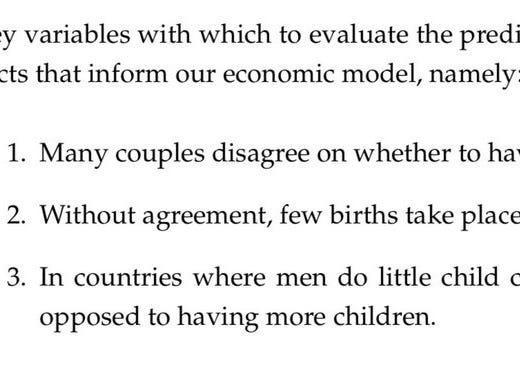
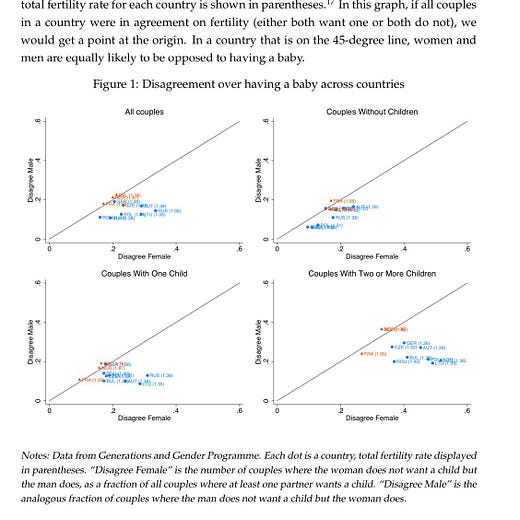

Devon ☀️ @devonzuegel
in discussions of declining fertility rates, the fact that many women are terrified of giving birth almost never comes up
women are acutely aware that pregnancy can be extremely painful, cause lifelong physical damage, and even be life-threatening
this seems... relevant...
5:11 PM · Nov 17, 2021
2 Reposts · 21 Likes

Ethan Mollick@emollick
The key long-term human trend may be the Demographic Transition: at a GDP/person of between $1.8k-$3k, mortality & fertility rates drop. Out of 186 countries:
🪦All started & 175 finished the mortality transition
👶All (but Chad) started & 80 finished the fertility transition
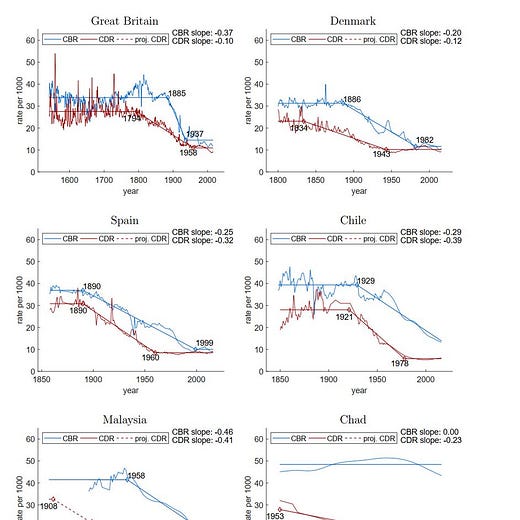
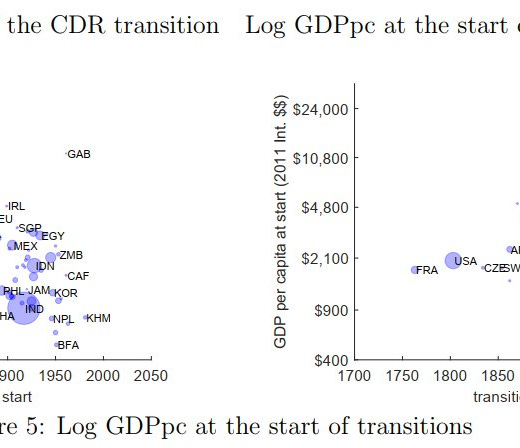
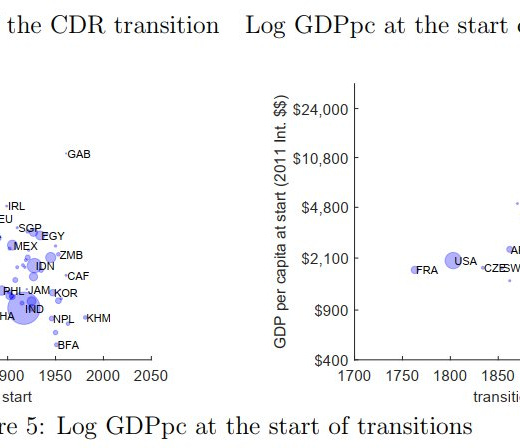
2:58 AM · Nov 19, 2021
8 Reposts · 36 Likes

Shengwu Li@ShengwuLi
What an identification strategy.
WWII torpedos sometimes explode and sometimes they don’t, by chance. This affects promotions of submarine crews, and their life outcomes.

Brad DeLong 🖖 💉 @delong
https://t.co/etgKAwlW7X
Key Insights: Matt Suandi—forced off of his India RCT development-economics project by the COVID plague—has taken the plague year to write a brilliant paper: Matthew Suandi: Promoting to Opportunity: Evidence and Implications from the U.S.... 1/
7:33 PM · Nov 17, 2021
59 Reposts · 359 Likes

Eric Ohrn@real_eric_ohrn
Our research team (@MarkCurti, @DangGarrett, Kevin A. Roberts, @J_C_Suarez, and me) is excited to share our new working paper,
“Capital Investment and Labor Demand”
NBER link: nber.org/papers/w29485
Ungated: jcsuarez.com/Files/Bonus_RD…
Summary thread below.

12:29 PM · Nov 15, 2021
23 Reposts · 91 Likes

Anna Stansbury@annastansbury
As an Economics undergrad at @Cambridge_Uni 2010-13, I learned a lot about Alfred Marshall.
I never learned how he fiercely and actively opposed women's participation in academic life at Cambridge, including that of his wife, economist Mary Paley.
nber.org/papers/w29481

6:10 PM · Nov 15, 2021
97 Reposts · 463 Likes

Dennie van Dolder@dvdolder
In our paper “Does Losing Lead to Winning? An Empirical Analysis for Four Sports”, which was accepted by Management Science last week, we attempt to replicate the finding that being slightly behind halfway through a competition increases the chance of winning. A thread below👇

2:41 PM · Nov 15, 2021
49 Reposts · 275 Likes

Lionel Page@page_eco
How to represent RDD and DID in DAGs.
by @KordingLab
nature.com/articles/s4358…
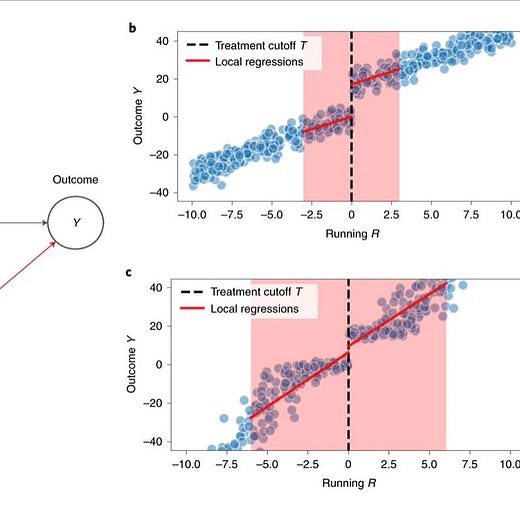
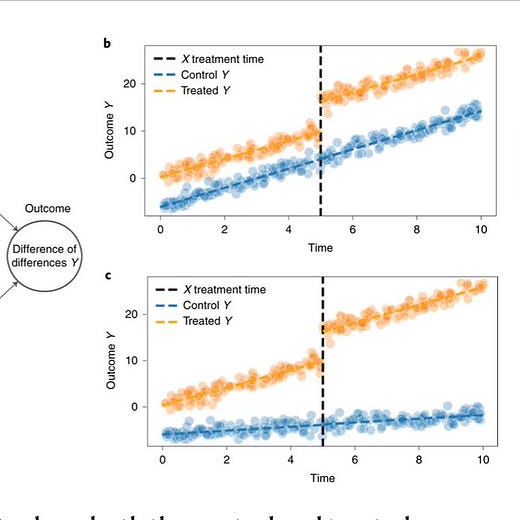
12:32 PM · Nov 16, 2021
4 Reposts · 55 Likes

Aaron Chalfin@AaronChalfin
A 2017 paper in Nature studies a police slowdown in NYC, and concludes that when the police pulled back, major crimes fell as a result. My co-authors, @dmitre88 & @MWillJr and I have re-analyzed the data and believe this result doesn't hold water. 👇
dropbox.com/s/yuk5pw69kpfo…

2:23 PM · Nov 16, 2021
78 Reposts · 311 Likes

Florian Ederer@florianederer
🏭+🎩=💵
@BPellegrino_UMD and I study the welfare costs & distributional effects of #CommonOwnership in the US economy.
TLDR:
We estimate that the deadweight loss of common ownership has increased dramatically to between 1.9% and 4.4% of total surplus.
florianederer.github.io/co_welfare.pdf

12:03 PM · Nov 16, 2021
19 Reposts · 103 Likes
Interesting discussions

Jesse Bruhn@jmb112485
I met with some Ph.D. students tonight who asked me for job market advice (which was a very weird experience for me since I clearly have no idea what I'm doing).
One wrote me an email afterwards asking ''What does it take to be competitive for academic jobs?''
1/n
3:41 AM · Nov 13, 2021
71 Reposts · 361 Likes

Ben Golub@ben_golub
One thing I wish I'd known as a student: when advisors suggest you consider shelving a research project it is often a vote of confidence in your potential.
It is a signal about the quality of the project but also one about the value of your time... easy to not notice the latter.
3:23 PM · Nov 11, 2021
36 Reposts · 666 Likes

Ryan Decker@UpdatedPriors
We still don't know for sure how many businesses died in 2020, but we do have BLS BED closures (which includes both deaths and temporary closures), openings, and births (so reopenings are openings-births). We can get a pretty good deaths estimate with the following method:

1:59 AM · Nov 16, 2021
9 Reposts · 29 Likes

Chris Blattman@cblatts
Great article, looking at the claim that CBT is better than cash and other charitable offerings. As someone who spent the last 15 years studying cash and also CBT, I have thoughts.

dylan matthews @dylanmatt
CBT: it’s really good!
https://t.co/aB5Y4hrzWP
2:15 PM · Nov 19, 2021
30 Reposts · 120 Likes

